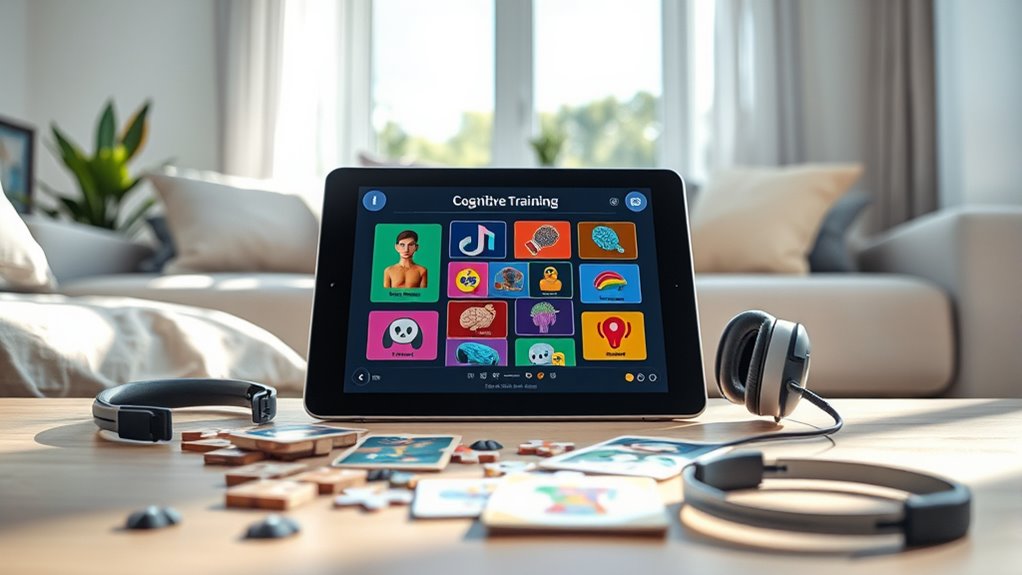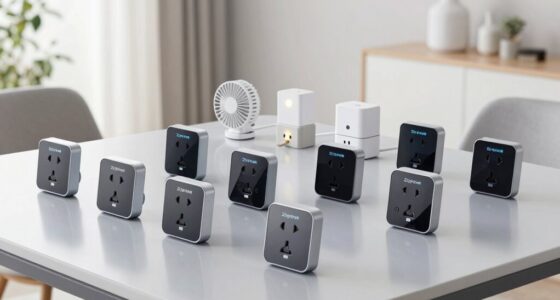If you want to boost your brainpower in 2025, I recommend exploring a variety of cognitive training games. These include large-print puzzles, memory challenges, logic and math problems, and engaging card games that enhance reasoning and memory. Many options are designed for seniors and adults, with features that support accessibility and ease of use. Keep going, and I’ll share more about the best tools to keep your mind sharp.
Key Takeaways
- Cognitive training games like puzzles, memory matching, and problem-solving enhance mental agility and memory retention.
- Large-print, accessible formats support users of all ages and cognitive levels, including seniors and those with visual impairments.
- Diverse game types such as crosswords, Sudoku, and mazes provide comprehensive brain workouts to boost reasoning and critical thinking.
- Portable, user-friendly designs in physical or digital formats allow flexible, on-the-go cognitive training sessions.
- Incorporating multi-sensory activities and clear instructions ensures engaging, effective brain exercises suitable for lifelong mental fitness.
Memory Games for Seniors XXL Puzzle Activity Book with 501 Brain Exercises

If you’re looking for a fun and effective way to keep your mind sharp, the Memory Games for Seniors XXL Puzzle Activity Book with 501 Brain Exercises is an excellent choice. It offers a wide variety of puzzles like crosswords, Sudoku, mental arithmetic, and coloring pages, all designed to stimulate your brain. The large print makes reading easier, especially for those with vision issues. Whether you’re seeking simple challenges or more complex puzzles, this book caters to different skill levels. Many users find it engaging, relaxing, and beneficial for mental health. It’s perfect for solo or social activities, helping you stay mentally active and sharp.
Best For: seniors of all cognitive levels seeking engaging, large-print puzzles to maintain mental sharpness and dexterity in a fun, relaxing way.
Pros:
- Large print design makes reading and solving puzzles easier for those with poor vision
- Wide variety of puzzle types and difficulty levels suitable for different skill levels
- Includes coloring pages that promote relaxation and improve dexterity
Cons:
- Occasional errors in puzzle solutions or clues can cause confusion
- Lack of instructions for some games may make initial understanding difficult
- Some puzzles may be too simple or too complex for certain users, requiring guidance
Memory Games for Adults: XXL Puzzle Activity Book with 501 Brain Exercises

The XXL Puzzle Activity Book with 501 brain exercises is an excellent choice for adults seeking to boost their memory and mental agility, especially those in the early stages of cognitive decline. Its diverse puzzles, from crosswords to mazes, make daily mental workouts engaging and effective. Many users find it enjoyable and beneficial, using it as a regular brain refresher. Although some note the small print size, the book’s variety keeps the mind active and sharp. It’s a great gift for seniors or anyone wanting to maintain cognitive health, offering a fun, challenging way to strengthen memory and mental connections over time.
Best For: Adults seeking to enhance their memory, mental agility, and cognitive health, especially those in early stages of cognitive decline or looking for engaging brain exercises.
Pros:
- Offers a wide variety of puzzles including crosswords, mazes, and other brain exercises to keep the mind engaged.
- Serves as an effective tool for maintaining and improving cognitive abilities and memory.
- Suitable as a thoughtful gift for seniors or anyone interested in mental stimulation and health.
Cons:
- The small print size may require magnification tools for easier reading, which can be inconvenient.
- The book’s weight and thickness make it less portable for travel.
- Some puzzles may be challenging even for experienced enthusiasts, potentially leading to frustration.
Memory Activity Book for Adults
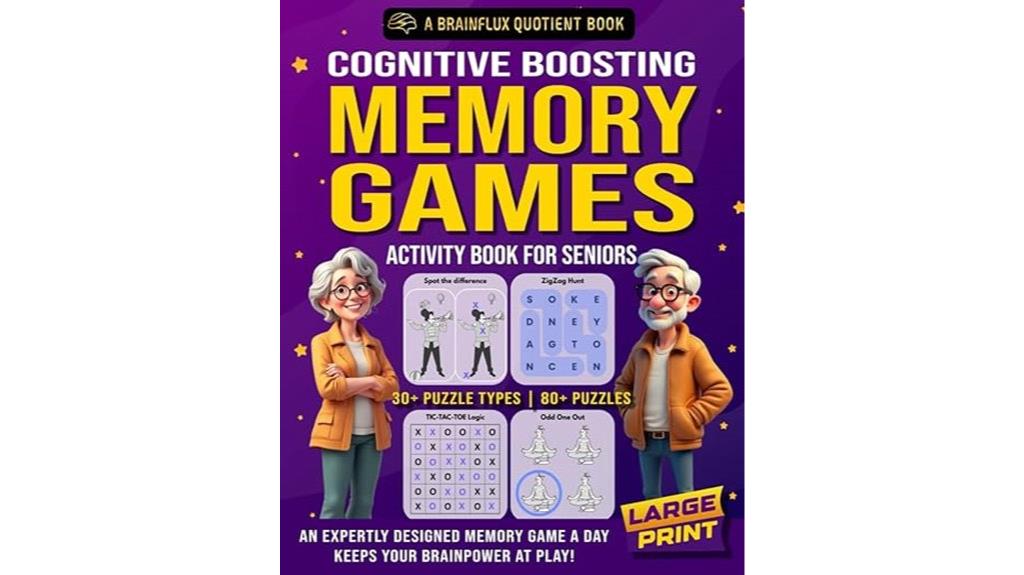
Memory Activity Book for Adults is an excellent choice for seniors or anyone looking to boost their cognitive skills through engaging mental exercises. It offers a variety of puzzles, brain games, and mental challenges designed to enhance focus, memory, and mental health. The large-print format makes it accessible, although the inside pages are black and white, which some may find less stimulating. Many users find it enjoyable and addictive, making it perfect for personal use or as a thoughtful gift for aging relatives. Keep in mind, some puzzles are easier and may require recycling for continued challenge. Overall, it provides good value for mental stimulation.
Best For: seniors and adults seeking engaging mental exercises to boost memory, focus, and cognitive health in a large-print, accessible format.
Pros:
- Wide variety of puzzles and brain games suitable for different skill levels
- Large print makes it accessible for individuals with visual challenges
- Enjoyable and addictive, making it ideal for personal use or as a gift
Cons:
- Inside pages are entirely black and white, which may be less stimulating visually
- Contains errors such as spelling mistakes and missing crossword clues, affecting quality
- Some puzzles may be too easy, requiring recycling for continued mental challenge
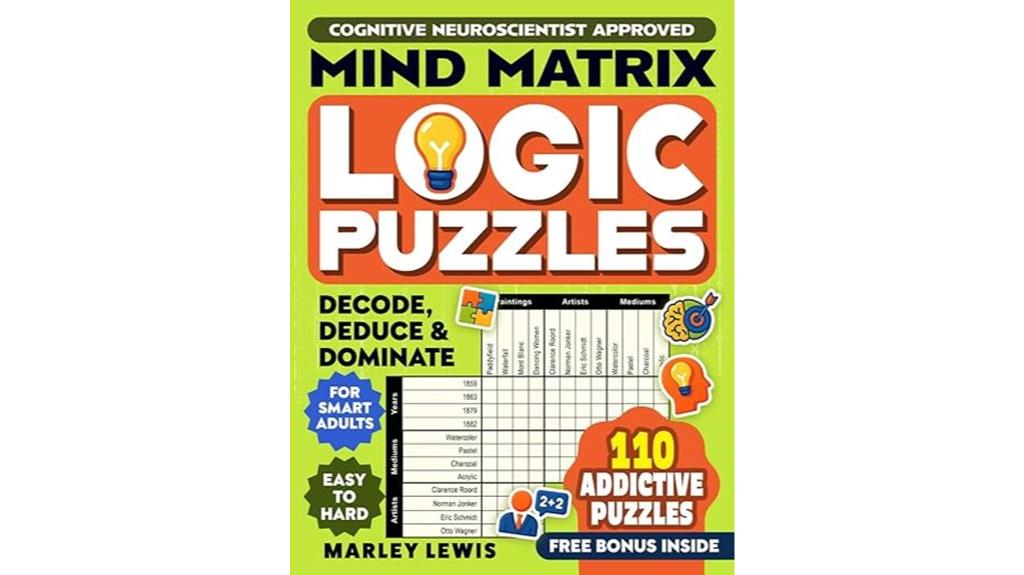
Mind Matrix stands out as an ideal choice for anyone seeking a versatile and engaging set of brain teasers, especially those interested in strengthening reasoning, memory, and problem-solving skills. With 110 grid logic puzzles, it offers a balanced mix of challenge levels suitable for beginners and advanced puzzlers. The puzzles are designed with a clean, accessible format, making them perfect for homeschooling, classrooms, or solo mental workouts. Users report sharper memory and a sense of achievement after completing challenges. Whether you’re rebuilding cognitive functions or just looking for fun mental stimulation, this puzzle book provides a rewarding, flexible way to boost your brainpower.
Best For: individuals of all ages seeking to enhance their reasoning, memory, and problem-solving skills through engaging and accessible brain teasers.
Pros:
- Offers a wide variety of puzzles suitable for beginners to advanced puzzlers, promoting gradual skill development.
- Designed with a clean, easy-to-understand format that is ideal for homeschooling, classrooms, or solo use.
- Helps improve cognitive functions such as reasoning, memory, and critical thinking while providing a fun and rewarding experience.
Cons:
- Some users may find the number of puzzles overwhelming at first, requiring time to navigate.
- A few puzzles have been noted to contain errors or inaccuracies in solutions, which can cause confusion.
- Limited space for notes or larger grids may restrict detailed work or note-taking during solving.
Cognitive Boosting Memory Games for Seniors: Brain Training Activity Book
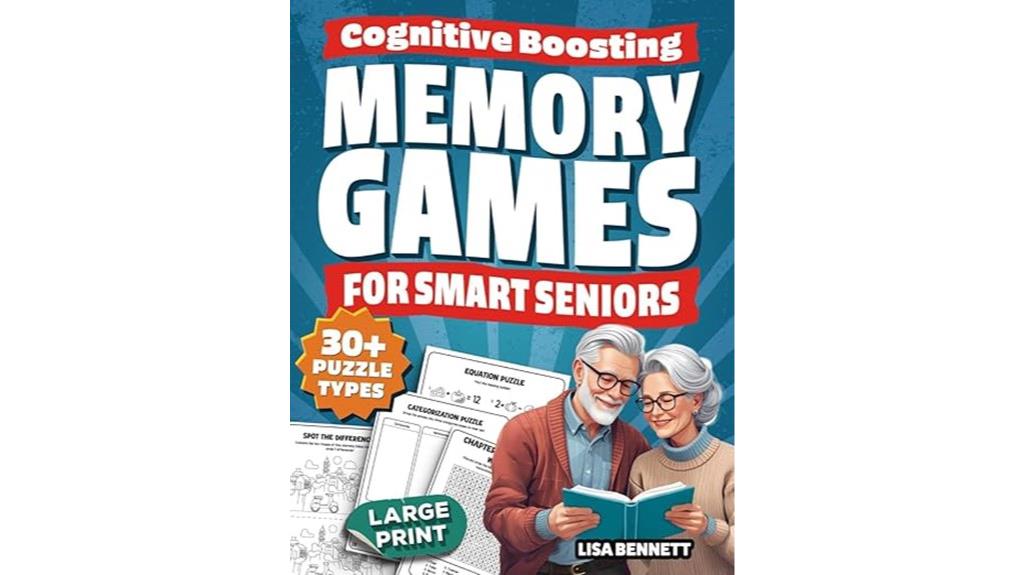
Designed specifically for seniors, the Brain Training Activity Book offers a wide range of puzzles that effectively boost memory and cognitive health. With 34 different puzzle types, including word searches, Sudoku variations with illustrations, and other brain games, it keeps minds active and engaged. The large print format makes reading easy, especially for those with visual challenges. Suitable for all skill levels, it provides a fun workout for memory and mental agility. Many users, including those in their 80s, enjoy hours of stimulating activity. This book makes a thoughtful gift for seniors or anyone looking to maintain cognitive vivacity while having fun.
Best For: seniors seeking engaging, cognitively stimulating activities to improve memory and mental agility in an easy-to-read format.
Pros:
- Offers a wide variety of 34 puzzle types to keep users engaged and challenged.
- Large print design enhances readability, ideal for seniors with visual challenges.
- Suitable for all skill levels, providing enjoyable mental exercises for a broad age range.
Cons:
- Some puzzles may be too simple for highly advanced or very intelligent users.
- Might require additional puzzle books for those seeking more variety or advanced difficulty.
- Limited to print format, no digital or interactive options available.
399 Games, Puzzles & Trivia Challenges
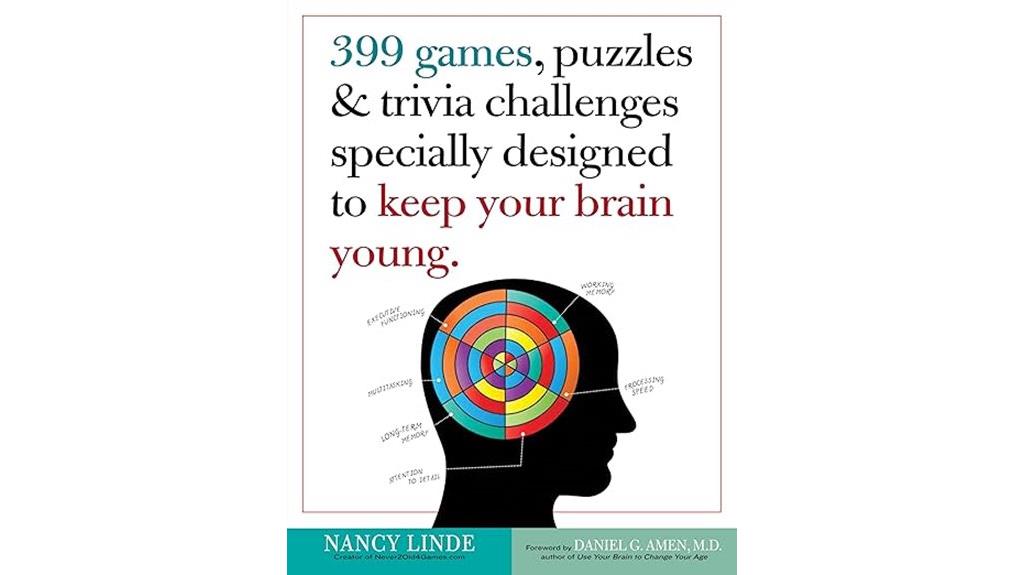
If you’re looking for a versatile way to sharpen your thinking skills and keep your brain engaged, “12 Best Cognitive Training Games” offers an excellent selection of puzzles, trivia, and challenges suitable for all ages. This activity book, Nancy Linde’s highly regarded collection, features over 300 pages of logic problems, riddles, word games, and trivia that stimulate memory, creativity, and critical thinking. With a variety of difficulty levels, it keeps things interesting and encourages daily mental workouts. Its clear layout and diverse content make it perfect for families or anyone wanting a fun, educational way to maintain mental sharpness while enjoying engaging challenges.
Best For: individuals of all ages seeking a fun, educational way to boost their mental agility and enjoy family-friendly puzzles and trivia.
Pros:
- Offers a wide variety of puzzles and activities suitable for different skill levels.
- Promotes critical thinking, memory, and creativity while providing engaging entertainment.
- High-quality layout and diverse content make it an appealing and educational resource.
Cons:
- Some puzzles may require background knowledge of American culture, which could be limiting for non-American users.
- The focus is mainly on word-based activities, with fewer visual or spatial puzzles like mazes or Sudoku.
- As a physical book, it may not be as portable for on-the-go use compared to digital apps.
Easy Memory Activity Book for Adults
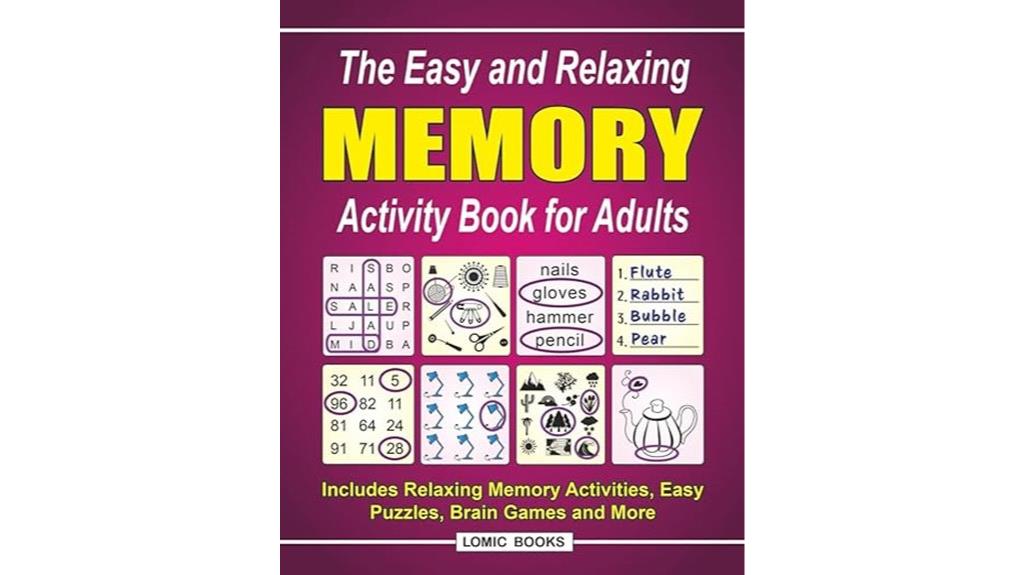
The Easy Memory Activity Book for Adults stands out as an ideal choice for seniors and individuals with mild cognitive impairment or early dementia. I’ve found it to be a gentle, engaging way to keep the mind active without frustration. The book offers a variety of simple puzzles like finding differences, math exercises, and counting tasks, all designed for easy comprehension. Its large print makes it accessible, and instructions are clear. Many users appreciate how it stimulates memory, relieves boredom, and fits into daily routines. It’s a practical, non-intimidating tool that helps maintain mental sharpness while providing relaxing entertainment.
Best For: adults seeking gentle mental stimulation, especially seniors, those with mild cognitive impairment, or early dementia looking for accessible and relaxing activities.
Pros:
- Easy to follow with large print and clear instructions, making it accessible for seniors.
- Offers a variety of puzzles and games that stimulate memory and mental engagement.
- Non-intimidating and relaxing, suitable for individuals with cognitive decline or recovery needs.
Cons:
- Some pages may be too dark or difficult to see clearly.
- The difficulty level is quite simple, which might not challenge cognitively healthy adults.
- Limited complexity may not satisfy those seeking more advanced or challenging puzzles.
Brain Games – Puzzles: Left Brain Right Brain
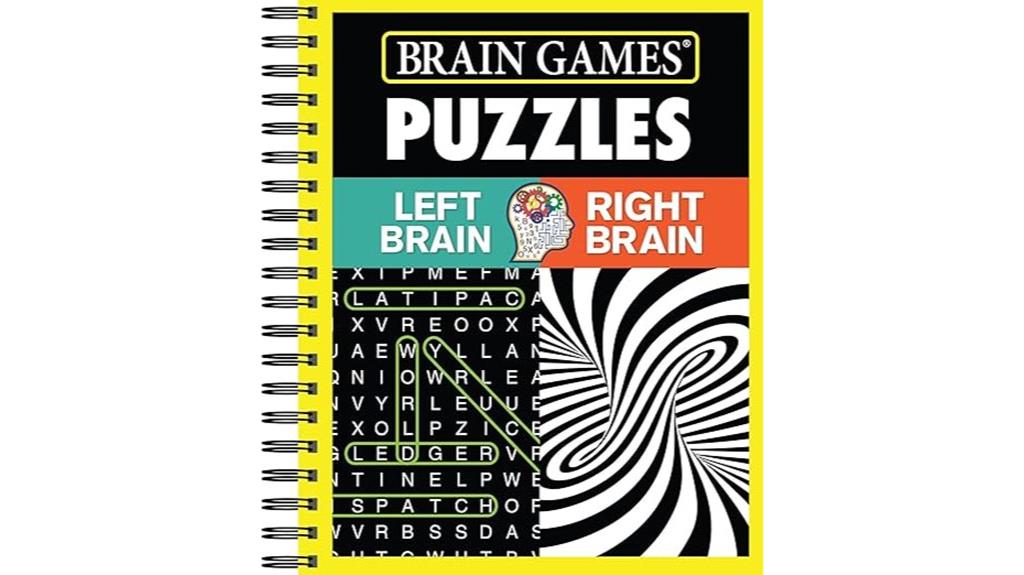
Are you looking for brain games that challenge both your creative and logical thinking? I’ve found puzzles that engage both hemispheres of the brain, perfect for all ages. These puzzles boost pattern recognition, analysis, and problem-solving skills while encouraging visual and verbal creativity. They range from easy to tough, offering hours of mental stimulation. Designed to promote teamwork or solo thinking, they also teach about brain functions, memory, and health. While some puzzles may be tricky at first, persistence pays off. With interactive interfaces and answer keys, these puzzles are a fun, educational way to enhance cognitive abilities and keep your mind sharp.
Best For: individuals of all ages seeking engaging, brain-stimulating puzzles that enhance reasoning, creativity, and cognitive health.
Pros:
- Offers a diverse variety of puzzles that challenge both logical and creative thinking.
- Includes educational content about brain function, memory, and health, adding value beyond entertainment.
- Suitable for solo or group activity, making it versatile for different settings and preferences.
Cons:
- Some puzzles may lack detailed instructions, potentially causing initial frustration.
- Certain puzzles require visualization or redrawing, which might not be ideal for print formats.
- The difficulty level varies, so beginners might find some problems too challenging without guidance.
8 Wooden Tiles Matching Dementia Activities for Seniors
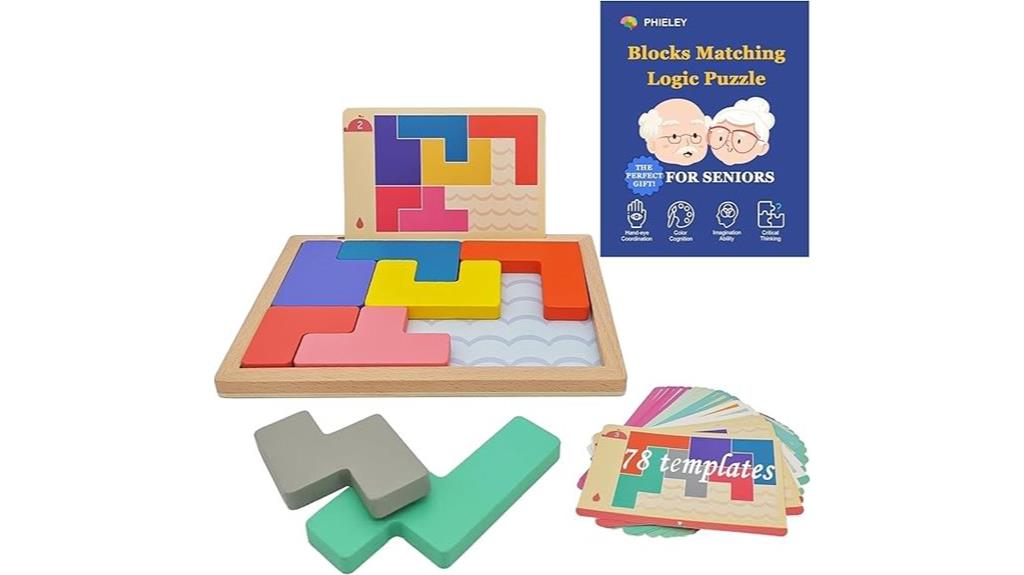
Wooden Tiles Matching Dementia Activities for Seniors stand out as an engaging and therapeutic option designed specifically for older adults with memory challenges. I find this activity board both calming and stimulating, offering a fun way to boost cognitive skills. The set includes eight large, vibrant wooden pieces that are easy to handle, along with a sturdy storage box for convenience. With 78 pattern-matching templates ranging from simple to complex, it encourages pattern recognition, shape exploration, and problem-solving. Many users appreciate its high-quality design and engaging colors, making it an excellent tool for promoting mental engagement, fine motor skills, and enjoyment for seniors with memory issues.
Best For: seniors, especially those with dementia or memory challenges, seeking engaging, calming, and cognitively stimulating activities.
Pros:
- Made with high-quality, vibrant wooden pieces that are easy to handle and durable
- Offers a wide variety of 78 pattern-matching templates suitable for different skill levels
- Promotes cognitive skills such as pattern recognition, shape exploration, and problem-solving
Cons:
- Slight color shading differences may cause some confusion during matching
- The rule book has minor misnumbering references that might require clarification
- Some users find the challenge level varies, which may require adult supervision or guidance
SUSSED The Wacky ‘What Would You Do’ Card Game

Sussed The Wacky ‘What Would You Do’ Card Game stands out as an ideal choice for families and friends seeking lively conversations and laughter. It’s designed to spark debate and reveal personalities through over 200 thought-provoking questions and 650 possible answers. Suitable for ages 10 and up, it’s perfect for boosting social skills while having fun. Whether at home, on road trips, or social gatherings, its portable size makes it easy to take anywhere. The game encourages sharing laughs, strengthening relationships, and challenging players to think creatively. Easy to learn and versatile, it’s a fantastic addition to any game night or summer adventure.
Best For: families, friends, and social groups seeking an engaging, laughter-filled game that encourages conversation and reveals personalities.
Pros:
- Promotes social interaction and strengthens relationships through fun questioning.
- Portable and easy to play anywhere, perfect for travel, gatherings, or game nights.
- Suitable for a wide age range, from tweens to adults, making it versatile for all players.
Cons:
- Some questions may be repetitive if played multiple times.
- May require additional games for more variety or extended play.
- Younger children under 10 might find some questions less appropriate or engaging.
Keeping Busy Match The Shapes Brain Games for Seniors
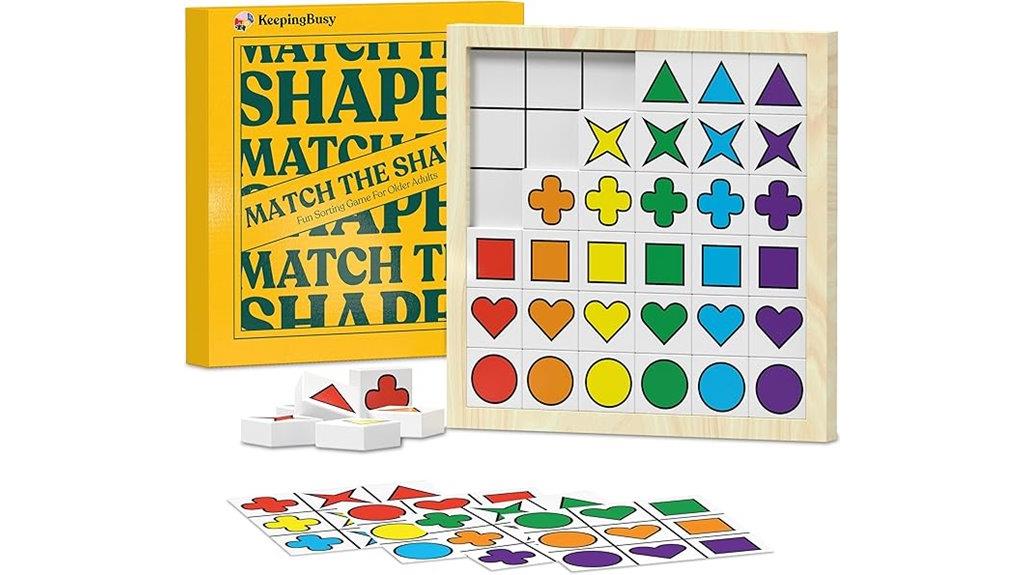
Keeping Busy Match The Shapes Brain Games are an excellent choice for seniors with dementia or memory challenges because they promote mental stimulation through simple, colorful shape and color matching tasks. With 36 large, stackable tiles, these games encourage tactile engagement, problem-solving, and focus. Designed for all cognitive levels, they include adjustable difficulty options to suit beginners or more experienced users. The activities support hand-eye coordination, dexterity, and multi-sensory stimulation, helping improve concentration and mental clarity. Compact and portable, they’re perfect for home, travel, or group settings, fostering social connection and calming engagement for seniors living with memory issues.
Best For: seniors with dementia or memory challenges seeking engaging, tactile activities to promote mental stimulation and emotional well-being.
Pros:
- Encourages tactile engagement and problem-solving through colorful, stackable tiles.
- Adjustable difficulty levels make it suitable for all cognitive abilities.
- Compact and portable design ideal for home, travel, or group activities.
Cons:
- May require supervision for very early or advanced users to ensure proper use.
- The activity might become repetitive over time without new variations.
- Limited to shape and color matching, which may not appeal to all individuals.
Large Print Memory Puzzles Book with 175+ Activities for Adults

If you’re looking for an easy-to-read, engaging way to boost your memory and mental focus, the Large Print Memory Puzzles Book with 175+ Activities for Adults is an excellent choice. Its large print makes it accessible for seniors and those with visual impairments, while the spiral binding allows the book to lay flat for easy use. With over 175 puzzles like word searches, mazes, and math games, it’s designed to stimulate your mind and improve focus. Though the variety is limited, many users find it effective, enjoyable, and a valuable tool for keeping the brain active and occupied, especially for seniors and those recovering from injuries.
Best For: seniors, adults with visual impairments, and individuals seeking engaging mental exercises to improve focus and memory.
Pros:
- Large print design makes it easy for seniors and visually impaired users to read comfortably
- Spiral binding allows the book to lay flat, enhancing usability during activities
- Contains over 175 puzzles that effectively stimulate memory and mental focus
Cons:
- Limited variety of puzzle types may reduce long-term engagement for some users
- Puzzles are primarily repetitive, which might become monotonous over time
- Some users may find the puzzles challenging, requiring patience and persistence
Factors to Consider When Choosing Cognitive Training Games

When selecting cognitive training games, I consider factors like age appropriateness, difficulty level, and puzzle variety to guarantee they’re engaging and suitable. Visual accessibility and the specific cognitive benefits the game offers are also important for a tailored experience. By paying attention to these points, I can choose games that truly support mental growth and enjoyment.
Age Appropriateness
Choosing the right cognitive training game depends heavily on the age group it’s designed for, as different ages have unique developmental and physical needs. For seniors, look for games with large print, simple instructions, and activities that accommodate sensory or motor limitations. It’s important that the content matches their cognitive abilities and is easy to guarantee navigation. For children and teens, select games that challenge their developmental skills without causing frustration or boredom. Themes and language should resonate with their age, boosting engagement and motivation. Regularly updating or choosing games aligned with specific cognitive milestones ensures meaningful mental stimulation. Prioritizing age appropriateness helps maximize benefits, making the experience enjoyable and truly beneficial for mental growth at every stage of life.
Difficulty Level
Selecting a cognitive training game with the right difficulty level is essential to keep users engaged and motivated. If a game is too easy, it quickly becomes boring, while overly challenging puzzles can cause frustration. Games with adjustable difficulty settings allow for personalized mental stimulation and gradual skill growth. For beginners or seniors with cognitive impairments, simpler puzzles help build confidence and prevent overwhelm. Advanced players, on the other hand, thrive on complex challenges that push their critical thinking and problem-solving skills. Incorporating a range of difficulty levels within a game or series encourages continued engagement as skills improve over time. Finding that sweet spot keeps users motivated, ensures steady progress, and maximizes the benefits of cognitive training.
Puzzle Variety
A diverse puzzle variety is vital for effective cognitive training because it engages multiple brain regions simultaneously. Including word games, logic puzzles, and memory challenges ensures that various skills—such as language, reasoning, and recall—are stimulated. Different puzzle types also cater to different skill levels, keeping the experience accessible and engaging for everyone. When a game offers a range of puzzles, it prevents boredom and motivates consistent mental exercise over time. Plus, exposure to varied formats encourages the development of critical thinking, problem-solving, and cognitive flexibility, as each puzzle presents new challenges. A well-rounded collection of puzzle types supports all-encompassing cognitive training, targeting memory, reasoning, attention, and spatial skills, ultimately boosting overall brainpower.
Visual Accessibility
When evaluating cognitive training games, considering visual accessibility can make a significant difference in how effectively you engage with the content. Large print formats with high contrast and bold fonts improve readability, especially for those with visual impairments or declining eyesight. Clear, simple layouts with minimal clutter help reduce visual confusion and make focusing easier. Using vibrant, distinguishable colors enhances visual stimulation and helps differentiate puzzle elements quickly. Avoiding overly small text, intricate fonts, or busy backgrounds ensures activities remain accessible for users with low vision. Additionally, incorporating visual cues, like icons or images alongside text, supports better comprehension and navigation. Prioritizing these features helps create an inclusive experience that allows everyone to fully enjoy and benefit from the games.
Cognitive Benefits
Cognitive training games offer a targeted way to boost mental skills like memory, attention, problem-solving, and reasoning. By engaging regularly, you can slow cognitive decline and improve neural plasticity, especially as you age. Different game types stimulate specific brain regions, supporting overall cognitive health and resilience. Incorporating a variety of difficulty levels keeps your mind challenged and promotes continuous growth. Evidence shows that consistent use of these games can lead to measurable improvements in daily functioning and quality of life. When choosing a game, consider how well it targets the skills you want to enhance and whether it adapts to your current ability level. The right game should be both engaging and effective, helping you build mental strength over time.
Portability & Storage
Ever wondered how easy it is to take your brain training on the go? When choosing cognitive games, portability and storage are key. Look for compact storage options like boxes, pouches, or folders that help keep everything organized and easy to transport. Opt for lightweight, portable designs that fit comfortably in bags, backpacks, or purses, making it simple to train anytime, anywhere. Check if the components are durable and resistant to damage during travel to make certain your investment lasts. Games with minimal or no assembly save time and hassle, allowing quick setup and packing. Additionally, digital or electronic options can add convenience, letting you access your favorite exercises on devices you already carry. Prioritizing portability makes consistent training more feasible and enjoyable.
Frequently Asked Questions
How Do Cognitive Training Games Improve Long-Term Brain Health?
Cognitive training games can really boost long-term brain health by challenging your mind and strengthening neural connections. I’ve found that regularly engaging in these games helps improve memory, attention, and problem-solving skills. They also promote neuroplasticity, which keeps your brain flexible and resilient as you age. By making learning fun and stimulating, I believe these games can help maintain mental sharpness and delay cognitive decline over time.
Are Digital or Physical Games More Effective for Cognitive Enhancement?
This question is more vital than ever, and I believe digital games often have the edge. They offer dynamic, adaptable challenges that keep your brain engaged and can be customized to target specific skills. While physical games are great for social interaction, digital ones usually provide a richer variety of tasks proven to boost cognitive functions. Ultimately, I think a blend of both maximizes your brain’s growth potential.
Can Cognitive Games Help Delay Cognitive Decline or Dementia?
I believe cognitive games can help delay cognitive decline or dementia. They challenge your brain, keeping it active and adaptable. Regularly engaging in these games may build cognitive reserve, potentially slowing deterioration. While they’re not a guaranteed prevention, I think they’re a valuable part of a healthy lifestyle, alongside physical activity and social interaction. Staying mentally stimulated keeps your mind sharp and resilient over time.
How Often Should One Engage in Cognitive Training for Optimal Results?
It’s funny how I stumbled upon this question about cognitive training frequency. I’d say, I usually aim for about 15-20 minutes daily or a few sessions several times a week. Consistency matters more than duration, so I try to stick with regular short sessions. This way, I keep my brain engaged without feeling overwhelmed, and I notice steady improvements over time. It’s all about finding what fits your routine best!
What Age Groups Benefit Most From Specific Types of Brain Games?
I believe that different age groups benefit from specific brain games tailored to their developmental needs. For example, children improve their problem-solving skills with puzzles, teens boost memory through strategy games, and seniors maintain cognitive sharpness with memory and attention exercises. I recommend choosing games appropriate for your age to maximize benefits. Engaging regularly in these targeted activities can keep your brain healthy and resilient at any age.
Conclusion
Imagine your mind as a vibrant garden, flourishing with each game you play. These cognitive training games are the sunlight and water that help your brain bloom, keeping memories crisp and thoughts sharp. Whether you’re solving puzzles or matching shapes, every activity adds color and life to your mental landscape. So, pick a game, immerse yourself, and watch your brain thrive in 2025 and beyond. Your mind’s garden awaits your nurturing!
